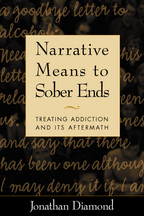Narrative Means to Sober Ends
Treating Addiction and Its Aftermath
Jonathan Diamond
Foreword by David C. Treadway
HardcoverPaperbacke-bookprint + e-book
Hardcover
orderJuly 25, 2000
ISBN 9781572305663
Price: $99.00 386 Pages
Size: 6" x 9"
Paperback
orderAugust 19, 2002
ISBN 9781572308350
Price: $49.00 386 Pages
Size: 6" x 9"
Working with clients who abuse drugs or alcohol poses formidable challenges to the clinician. Addicted persons are often confronting multiple, complex problems, from the denial of the addiction itself, to legacies of early trauma or abuse, to histories of broken relationships with parents, spouses, and children. Making matters more confusing, the treatment field is too often splintered into different approaches, each with its own competing claims. This eloquently written book proposes a narrative approach that builds a much-needed bridge between family therapy, psychodynamic therapy, and addictions counseling. Demonstrated are innovative, flexible ways to help clients form new understandings of what has happened in their lives, explore their relationships to drugs and alcohol, and develop new stories to guide and nourish their recovery.
“With eloquence, clarity, skill, and artistry, Diamond opens up a whole new perspective on the process of therapy for client and clinician, and on how narrative techniques can help in achieving recovery. Without abandoning biological or neurological research findings, he demonstrates innovative, flexible ways to help clients understand their lives and the role that drugs and alcohol play.”
—Readings
“[Diamond] exhibits good knowledge of psychotherapy's theoretical underpinnings in his lucid explanations of analytic concepts such as transference and countertransference....What comes through is the experience of a compassionate, successful therapist who integrates 12-step and psychotherapeutic principles in the treatment of his patients....Because he is such a good writer, the reader feels his and his patients' joys and sorrows....Narrative Means to Sober Ends will appeal both to new addiction treaters and to experienced therapists. With its integrated approach, the book should likewise attract a multidisciplinary readership.”
—Psychiatric Services
“Strongly recommended for anyone interested in (or concerned about) addiction and substance abuse, this is one of the most interesting books on addiction treatment to come out in years. Diamond provides a fresh approach to the topic in a highly readable format....All libraries need to purchase this book for the use of undergraduates, researchers, and general readers.”
—Choice
“This fluent, engrossing book takes us to the heart of the therapeutic relationship, into the experience of the therapist and the inner lives of clients. Powerful elements of 12-step approaches are interwoven with narrative therapy's brilliant use of letter writing. The poetic energy of Diamond's voice ties these strands together as he provides his own vivid commentary and reflections. Therapists, teachers, students, and concerned general readers should find in this book instruction without tears.”
—Lynn Hoffman, ACSW, author of Exchanging Voices
“Ever wonder how therapy feels to a recovering addict? Then you'll want to read this book and its many accounts of pain, loss, suffering, and recovery. Stories of survival tell more than any diagnosis about what has gone wrong in a person's life—some of the more impressive letters included in this book are addressed to the substance that started the addiction. Reading these stories and learning of their role in treatment, we begin to see how the images and metaphors that go into their telling are healing in their own right. Instead of punctuating his sessions with interpretations, Diamond weaves a coherent account that tries to make sense of an often-interrupted past, and his clients are clearly grateful. This book should be useful both in doctoral clinical programs and in workshops for experienced practitioners.”
—Donald P. Spence, PhD, Clinical Professor of Psychiatry, Robert Wood Johnson Medical School, UMDNJ; author of Narrative Truth and Historical Truth
“Poignantly describing the experience of the addict and of the therapist working with addiction, this book provides good advice for acting quickly and therapeutically with clients. Diamond draws extensively on his own experience to model a therapeutic stance that is open, direct, and egalitarian, without ever abdicating the importance of knowledge and clinical skill. He is always reality-based, whether dealing with behavior, affect, or unconscious motivation. The narrative method is well presented, and best of all is the sense the reader gets of the therapist's real presence and engagement. This book is a basic primer to help therapists become bicultural and bilingual—to become 12-step literate without giving up their own beliefs, theories, or first therapeutic language. Diamond moves away from a narrow, rule-bound, 'fix-it' mentality to offer a much-needed expansion in thinking, attitude, and principle.”
—Stephanie Brown, PhD, Director, Addictions Institute, Menlo Park, CA; author of The Alcoholic Family in Recovery
“I strongly urge anyone interested in understanding addiction to take this journey with Jonathan Diamond. This is an engaging and richly diverse guide to understanding the complexities of recovery. Diamond is a kind and creative advocate for the multitude of addicted adults and adolescents asking to be heard.”
—Dusty Miller, EdD, author of Women Who Hurt Themselves
Table of Contents
Foreword, TreadwayPrologue
Introduction: Remembering Addiction
I. Writing for Our Lives
1. A Sobriety of Literary Merit
2. Letters of Invitation and Dismissal
3. Bargaining: Controlled Drinking and Other Negotiated Settlements
4. Telegrams from God: Reauthoring Spirituality
5. Epilogues: Letting Go
II. Detoxing the Theory
6. Becoming 12-Step Literate
III. Stories for Our Times
7. Trauma and Recovery
8. Reality Bytes: Narrating Food Addictions
9. Writing Home: Applications to Family Therapy
10. Sobering Up Ophelia: Therapy with Children and Adolescents
11. Narrating Our Own Stories: Therapists in Recovery
IV. No Conclusions
12. A Less Convenient Fiction
Postscript: Muddling Through
